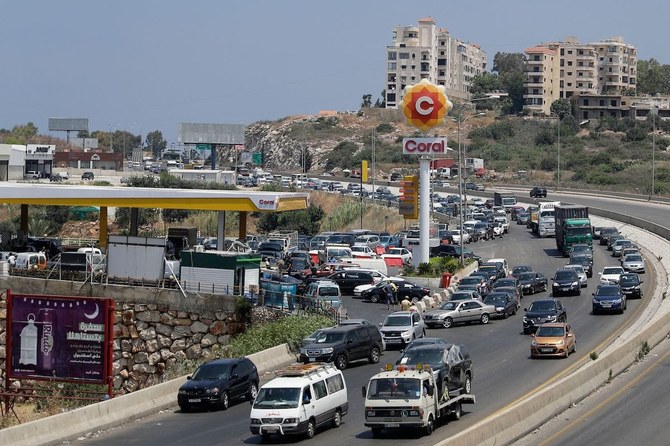
- ARAB NEWS
- 06 Jul 2025

Gas will be flowing to Lebanon in the next three months. This is what Amos Hochstein, the US State Department’s senior adviser for global energy security and the officer in charge of maritime talks between Lebanon and Israel, announced last week. This step is part of President Joe Biden’s frozen conflict policy, which aims to keep Lebanon afloat and prevent its fall. However, it is interesting to see where this gas will come from.
The current US government does not want to give a lifeline to the corrupt Lebanese government, but it wants to make the life of the people bearable. So it came up with the idea of supplying Lebanon with gas from Egypt. The energy crisis Lebanon has been suffering from risks totally crippling the country. The idea of supplying it with gas in the next three months aims to prevent the delay, or even cancelation, of the elections scheduled for March. The corrupt elite might have felt compelled to prevent the vote from going ahead due to it losing its grassroots base.
However, Egypt receives natural gas from Israel. A 90-km pipeline transfers gas from the Israeli terminal of Ashkelon to the receiving station of Al-Arish as part of the so-called Peace Gas Pipeline.
In October this year, an announcement was made about the construction of an additional $200 million pipeline to boost Israel’s exports of natural gas to Egypt by 3 to 5 billion cubic meters per year. The pipeline is partly expected to boost Egypt’s liquefied natural gas sales to Europe and Asia.
Basically, Egyptian natural gas is mixed with Israeli gas before it is exported. Under this new deal, it will be transported to Jordan through a Red Sea pipeline and from there on to Syria. In addition to the gas coming from Ashkelon via Egypt, the other supply to Jordan comes to the northern part of the country from Israel’s Leviathan field. Either way, the gas received by Jordan and subsequently sent to Syria is at least partially Israeli. The key question is: Will Lebanon be receiving Israeli gas?
According to sources, discussions were held with the Lebanese government over arranging a swap to avoid the embarrassment of the country being rescued by Israeli gas. This would mean that, as the supply arrives in Syria, it will be used there and replaced by Syrian gas. Hence, the gas that reaches Lebanon will be from Syria, while Syria will be using the Israeli gas. This would raise some important questions. What happened to the resistance rhetoric that is the fig leaf of the Syrian regime’s legitimacy? How could a regime that has failed to deliver for its people on all fronts and whose only claim to legitimacy is its resistance to Israel accept such a deal?
The irony is that Hezbollah, which has shown “resistance” to Lebanon’s talks with Israel over maritime demarcation — that could lead to a deal that would allow Lebanon to extract gas from its own waters — under the pretext of refusing any dealings with the “Zionist enemy,” seems OK with a deal that involves importing Israeli gas. While it wants to block the demarcation talks so that it does not lose the point of contention with Israel, it allows a deal that involves Israeli gas because it sees in it a lifeline for the system. After all, as one energy expert told me, gas molecules do not carry flags — Hezbollah can always claim it is Egyptian gas. Hence, this deal will not strip Hezbollah of the narrative that Israel is usurping Lebanese land, water and sovereignty, and that it is the defender of Lebanon against the Zionist enemy.
As one energy expert told me, gas molecules do not carry flags — Hezbollah can always claim it is Egyptian gas.
Dr. Dania Koleilat Khatib
Another question is how such a deal can be passed without breaching America’s Caesar Act, which forbids any dealings with the Syrian regime? The Arab Gas Pipeline was a step taken by Jordan to indirectly normalize with the Assad regime. Helping Lebanon to get the energy it badly needs is the perfect narrative to start the process. Lebanon has been assured that the gas that passes through Syria will be exempt from the Caesar Act. However, such a step will receive some pushback in the US Congress. In August, Republican Rep. Bryan Steil and Sen. Joe Wilson requested a report on the economic benefits for the Syrian regime of operating the Arab Gas Pipeline. However, some proponents of the deal say it will prevent Lebanon from getting oil from Iran, which would entrench its captivity to the whims of Hezbollah and Tehran.
The deal has many dimensions. One is an indirect normalization with Bashar Assad — could that lead to an effort to rehabilitate Assad and push him to break from Iran? Another would be Israel’s indirect normalization, just as it is trying through economic and development projects to break its isolation from the Arab world. The third dimension is preventing a total collapse of Lebanon, as the US does not want to handle the repercussions of such a collapse. Despite all these aspects, one important point remains yet to be highlighted: How can Hezbollah and the Assad regime, whose entire legitimacy is based on resistance to Israel, accept a deal that involves Israeli gas?